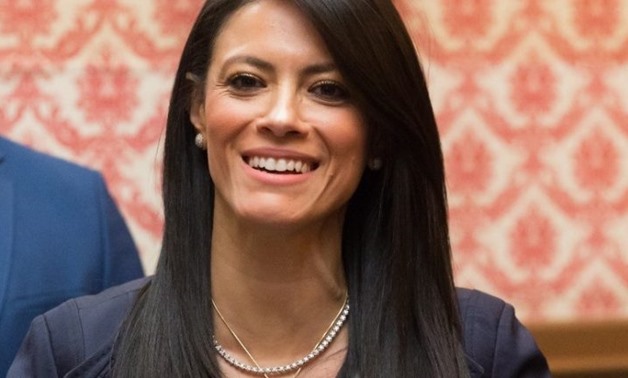
FILE: Minister of International Cooperation Rania al-Mashat
CAIRO - 14 April 2021: The sustainable recovery roadmap post the COVID-19 pandemic continues to be at the forefront of global priorities. In “Economic Recovery Post-Pandemic”, the virtual roundtable discussion hosted by Indiana University’s Institute for International Business and Kelley School of Business, the Minister of International Cooperation Rania A. Al-Mashat spoke about resilience and agility in the face of crises on March 31.
This virtual event is part of a roundtable discussion series that addresses economic recovery, global challenges, disruptions, and trends. In a panel centered on the Middle East and moderated by Steve Lutes, the vice president of Middle East Affairs at the U.S. Chamber of Commerce, Al-Mashat was a panelist alongside Janamitra Devan, NEOM’s Chief Strategy Officer; and Annie Chu, Executive Director Middle East & Africa at Cummins.
While the pandemic is foremost a humanitarian challenge, it should not derail the world from progressing towards the achievement of the UN Sustainable Development Goals (SDGs). In the case of Egypt, the Government has pushed through with many of the planned structural reforms, related to social safety nets, financial inclusion, and digitalization.
“The pandemic is originally a health crisis, but it is as well a socioeconomic challenge for the global nations,” said Al-Mashat. She elaborated that it is the agility and resilience of the people that will help countries progress and develop, regardless of the crises.
Egypt was able to cushion the consequences of the pandemic by agile policy making, leading to the development of a homegrown economic reform program. In collaboration with the International Monetary Fund (IMF), the reform structures were put in motion between 2016 and 2019; and in 2020, a support deal was renewed between the Government of Egypt and the IMF in order to support the government’s response plan en-face of the pandemic and in line with our 2030 national agenda. We are keen on making it through by ‘leaving no one behind’,” said Al-Mashat.
As the first quarter of 2021 comes to an end, Egypt is focused on moving towards clean energy for a green recovery, a well-rounded digital transformation across all sectors, and a targeted focus on industry and investments.
Al-Mashat added that as countries recover from the pandemic, a focus on green energy must be maintained. Going hand in hand with digitalization, Egypt is set on building new cities, such as the New Administrative Capital that is set to become the country’s first smart city. The NAC will include a city-wide digital security system as well as sustainable infrastructure to reduce consumption and cost with a focus on renewable energy.
The Minister explained that it was through Economic Diplomacy that the Ministry of International Cooperation was able to keep Egypt’s economic growth on track. Commitment to charting progress towards the SDGs helped the ministry secure $9.8 billion in development financing as of January 2020, from multilateral and bilateral development partners; despite the 8 percent decrease in global development financing caused by the economic instability due the pandemic.
One of the pandemic’s silver linings is the catalyzation of the digital transformation. Al-Mashat explained that the digital economy will require a new range of skill-sets that rising entrepreneurs will need to develop in order to utilize the technologically-led business ecosystem. “We are seeing the rise of young, fresh and talented innovators and entrepreneurs in the market, particularly in the digital and FinTech sectors, positioning Egypt in a unique stance as it grows to become a regional startup hub,” said Al-Mashat.
“The pandemic forced us to adopt technology at a much faster rate than we expected,” said Annie Chu, Executive Director Middle East & Africa at Cummins.
“If we look deeper, we will find a silver lining in the way new structures are occurring; the trade in data has become massive connecting the world more than ever before. We are rapidly transforming from a world of tangible trade to a world of intangible trade; digitization is occurring across all sectors” said Janamitra Devan, NEOM’s Chief Strategy Officer.
The Government of Egypt is committed to its “Integrated Sustainable Energy Strategy 2035” that abolished the use of coal for electricity generation and replaced it with renewable energy sources. The strategy targets the production of 20 percent of electricity from renewable sources by 2022, 55 percent by 2035, and 61 percent by 2040.
Egypt’s development is centered around catalyzing economic growth, promoting new job opportunities in a digitally developed environment, encouraging private sector engagement, and growing its use of renewable energy sources; molding the country’s sustainable future.
Comments
Leave a Comment